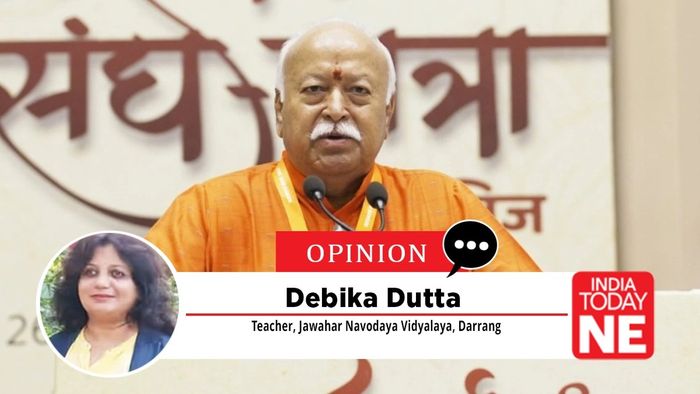Hindutva Beyond Labels
There are moments in history when words once misused or misunderstood must be restored to their original radiance. Mohan Bhagwat’s recent address in Bengaluru was one such moment. His distinction between Hinduism and Hindutva was not an exercise in semantics but an act of civilisational remembrance—a call to look inward and reclaim the meaning of a word that has, for too long, been trapped in polemics.

- Nov 10, 2025,
- Updated Nov 10, 2025, 11:08 AM IST
There are moments in history when words once misused or misunderstood must be restored to their original radiance. Mohan Bhagwat’s recent address in Bengaluru was one such moment. His distinction between Hinduism and Hindutva was not an exercise in semantics but an act of civilisational remembrance—a call to look inward and reclaim the meaning of a word that has, for too long, been trapped in polemics.
With calm conviction, he reminded that Hinduism sounds like a closed construct born of colonial vocabulary, whereas Hindutva embodies the open, ever-evolving consciousness of Bharat itself—a spiritual rhythm that breathes through its history, culture, and people.
Bhagwat’s reflections did not emerge from political urgency but from a deeper philosophical concern. In his reading, Hindutva is not a creed but a consciousness—a moral ecology that harmonises all forms of existence. It has no founder, no rigid dogma, and no central book; its essence lies in its capacity for samanvay, for harmonising differences without erasing them.
The term Hinduism, by contrast, is a later coinage—an external label that often fails to capture this fluid civilisational continuity. When Bhagwat distinguishes the two, he is not dividing faiths but freeing the Indian spiritual tradition from the narrow frame of Western “isms.”
In essence, his address reclaimed the timeless moral philosophy that sustains the idea of Bharat. To be Hindu, in his articulation, is not to belong to a sect but to embody an awareness of interconnectedness. The Rig Veda long ago affirmed, Ekam sat viprabahudhavadanti—Truth is One, though the wise call it by many names. That single line distills the spirit of Hindutva: inclusivity without dilution, unity without uniformity. It is not a faith that fears the other, but one that finds the divine reflected in every form of life.
Bhagwat’s exposition carries quiet urgency in a world splintered by self-interest and anxiety. Modern civilisation, he implied, is burdened by the fatigue of materialism and the loneliness of excess. In such an age, the Hindu civilisational outlook—anchored in dharma, compassion, and balance—offers not nostalgia but renewal. Hindutva, in that sense, is not the memory of the past but the moral proposition for a fractured world. Its vision of VasudhaivaKutumbakam—the world as one family—is not a slogan; it is a civilisational grammar of coexistence.
At the core of Hindutva lie the values that have guided Indian civilisation for millennia: dharma as the sustaining principle of order; ahimsa as the discipline of empathy; seva as the expression of duty; and atma-anubhava—self-realisation—as the highest freedom. These are not abstractions but lived realities that have allowed multiple faiths, philosophies, and languages to grow without conflict on this soil. It is this moral architecture that Bhagwat sought to reaffirm, not as a political ideal but as a cultural inheritance.
In the intellectual tradition of the Sangh, Bhagwat’s thought stands in conversation with figures like Veer Savarkar and PanditDeendayalUpadhyaya. Savarkar had described Hindutva as the cultural identity of those who see India as both Pitribhumi and Punyabhumi—the land of their ancestors and of their sanctity. Bhagwat extends that idea beyond geography and faith, reinterpreting it as a universal moral consciousness. It is not about exclusion but about expanding the sense of belonging, about transforming identity into empathy.
Also Read: Growth with Roots
In doing so, he also reclaims the essence of Indian nationalism, which was never born of conflict but of coherence. For the West, nationhood often arose from resistance; for India, it evolved from the spiritual intuition of unity. Bhagwat’s distinction between Hinduism and Hindutva thus becomes a reminder that India’s civilisational strength lies not in uniformity but in harmony—a balance between individuality and integration, reason and reverence, material pursuit and spiritual restraint.
By drawing the discourse away from political binaries and returning it to the moral centre, Bhagwat offers both adherents and critics an invitation to introspect. Hindutva is not a counterpoint to secularism but its natural completion, because it recognises that spirituality and social duty must coexist. The modern world may speak the language of rights, but the Indian mind, steeped in dharma, speaks the language of responsibility. It is in that ethical imagination that Bhagwat locates the continuity of the Hindu ethos.
The quiet dignity of his speech reflected the deeper rhythm of the RSS journey—one that began with the idea of national regeneration and has evolved into a vision of universal harmony. To him, Hindutva is neither political assertion nor cultural nostalgia; it is a civilisational pulse, an inner discipline that transforms society through service and self-realisation. It calls not for dominance but for moral leadership; not for uniformity but for shared purpose.
Bhagwat’s words in Bengaluru, thus, were more than an address—they were a philosophical meditation on India’s timeless quest for truth. Beneath the calm articulation lay a conviction shaped by a century of the Sangh’s silent work of integration and service. In a world yearning for meaning beyond power, his interpretation of Hindutva offers a rare reminder: that spirituality, when lived with humility, becomes the highest form of humanism.
And perhaps that is where his message finds its quiet brilliance—that the destiny of Bharat is not to conquer, but to harmonise; not to instruct the world, but to illuminate it by example. Hindutva, in its truest form, is the breath of that illumination—the enduring consciousness of a civilisation that continues to guide without imposing, to evolve without losing its soul.